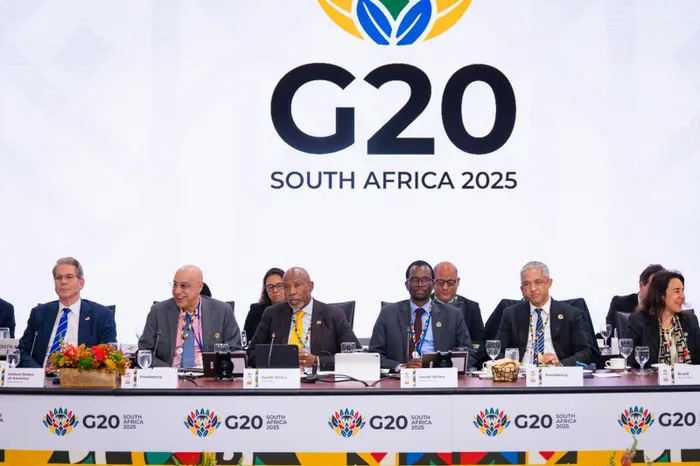G20 finance chiefs push for sustainable growth, debt relief, and stronger African engagement
G20

The fourth G20 Finance Ministers and Central Bank Governors meeting is underway in Washington, D.C. This marks the final meeting ahead of the G20 Leaders’ Summit in November.
Image: Supplied
Finance ministers and central bank governors from the world’s largest economies have reaffirmed their commitment to stabilising global growth, tackling debt vulnerabilities, and enhancing Africa’s voice in global financial governance.
The two-day meeting held in Washington, D.C., brought together key global policymakers amid an environment of persistent uncertainty, geopolitical tensions, and uneven post-pandemic recovery.
The G20 noted that the global economy remained resilient in the first half of 2025 but continues to face elevated uncertainty due to ongoing conflicts, supply chain disruptions, high debt levels, and climate-related shocks.
While disinflation is progressing across several economies, co-chair and South Africa's deputy finance minister, David Masondo, said members stressed the importance of maintaining central bank independence and data-dependent monetary policy to ensure lasting price stability.
With fiscal pressures and record-high debt, Masondo said the G20 urged members to pursue growth-oriented macroeconomic policies, rebuild fiscal buffers, and accelerate structural reforms to boost investment, productivity, and job creation.
"We have emphasised the need for global policy responses that reflect the lived realities of emerging markets and developing economies, including low growth, constrained fiscal space, rising debt service costs and limited access to long-term affordable housing," Masondo said.
"Our focus on Africa permeated the finance track where significant progress has been achieved, advancing the multilateral development backpack to make them bigger, better and more effective for developing countries."
Masondo said members also adopted the G20 declaration on debt that creates low growth, debts as a divinity and commits to engage with borrower countries while enhancing their agency.
In the Ministerial Declaration on Debt Sustainability, members said they recognise that a high level of debt is one of the obstacles to inclusive growth in many developing economies, which limits their ability to invest in infrastructure, disaster resilience, healthcare, education and other development needs.
They reaffirmed their commitment to support efforts by low- and middle-income countries to address debt vulnerabilities in an effective, comprehensive and systematic manner.
They also reiterate their commitment to further strengthen the implementation of the Common Framework for Debt Treatments beyond the Debt Service Suspension Initiative in a predictable, timely, orderly, and coordinated manner
"Ministers also signed a package to the first ever G20 Ministerial Declaration on Debt and Sustainability, which signals the intent of the G20 to do more in tackling unsustainable levels of debt along the rising cost of capital, particularly for African countries," Masondo said.
"The meeting delivered constructive discussions on the global economic outlook, macroeconomic stability, the international financial architecture and the financial sector issues. Indeed, we are slowly making progress towards the quest for cheaper, faster, more transparent and inclusive payments, particularly in sub-Saharan Africa."
Under the sustainable finance agenda, members backed the 2025 G20 Sustainable Finance Report, emphasising the importance of climate resilience, adaptation finance, and private sector mobilisation.
They encouraged Vertical Climate and Environmental Funds, Multilateral Development Banks, and national development banks to align strategies and scale up investments that support both mitigation and adaptation.
Members supported work to improve voluntary carbon markets, endorsing the Common Carbon Credit Data Model (CCCDM)—a framework aimed at ensuring integrity and interoperability in carbon credit trading—set to be piloted in 2026.
The G20 also reaffirmed its commitment to implementing the Sustainable Finance Roadmap, describing it as a multi-year, action-oriented plan to tackle systemic barriers and unlock development co-benefits.
Recognising infrastructure as a key growth driver, members endorsed three reports aimed at improving project preparation, blended finance de-risking, and cross-border project coordination.
Members also welcomed the Review of G20 Finance Track Operating and Decision-Making Processes, led by South Africa, as the G20 concludes its first full presidential cycle since the pandemic.
The review proposed periodic evaluations every five years and the establishment of an institutional repository to enhance continuity and knowledge sharing.
Eurodad, a network of 58 civil society organisations from 28 European countries working for economic justice, said the Declaration on debt is inadequate and unambitious – falling far short of what is needed to tackle the worst debt crisis the world has ever seen.
“We are extremely disappointed to see absolutely nothing new in the G20's Declaration on debt today. It reiterates limited and ineffective tools like the Common Framework for Debt Treatments instead of supporting real reforms at a more inclusive forum - the UN," said Iolanda Fresnillo, policy and advocacy manager at the European Network on Debt and Development.
"South Africa - like Brazil before them - said debt would be one of the priorities of their Presidency. The declaration published today is the latest illustration that the non-inclusive, non democratic G20 is the wrong space to advance on real solutions for debt."
BUSINESS REPORT